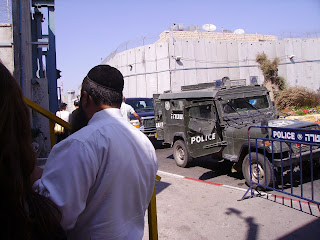30 September 2009
Yom Kippur
27 September 2009
A bit of politics
Two policeman and two Muslim worshippers were lightly injured in riots which erupted Sunday morning at the Temple Mount holy site in Jerusalem.
The incident began when a group of tourists entered the Temple Mount compound accompanied by a police force. At a certain stage, some 150 worshippers started gathering around them and calling out towards them.
Some of the worshippers began throwing stones at the group. The police force fired stun grenades in an attempt to gain control of the riot. Two police officers were lightly injured by stones and received medical treatment on the site. They were later evacuated to the Shaare Zedek and Hadassah Ein Kerem hospitals in the capital.
Two worshippers were lightly hurt by the grenades and were evacuated to the al-Maqasid Hospital in east Jerusalem. According to Palestinian sources, 13 people were hurt after inhaling tear gas. Adult worshippers attempted to calm things down, while the group of tourists was removed from the site.
The defense establishment has declared a heightened state of alert across the country ahead of the Jewish holiday of Yom Kippur. On Saturday evening, a closure was imposed on the West Bank until Monday at midnight. Residents will only be allowed to cross into Israel in humanitarian cases.....
Vehicles will not be allowed to pass from east Jerusalem to the western part of the city in order to minimize the friction between Jews and Arabs.
26 September 2009
Me'or Modi'im
25 September 2009
The end - #1
22 September 2009
Gaya
20 September 2009
Rosh Hashanah (part 2)
19 September 2009
Rosh Hashanah (part 1)
- The mechitza. I’m usually okay with mechitzas, but this one is a solid grey curtain going all the way to the front. It doesn’t bother me so much that I can’t see the guys—well, except for when the guys are singing and no one on the women’s side is. But what bothers me is the fact that I can’t see the Torah, or the ark for that matter. How can I stand in front of an open ark when I can’t see the ark in the first place? What goes does hearing the Torah reading do if I can’t see the actual Torah. Forget for a moment that it would never happen in an Orthodox synagogue, but how do I know they’re not just reading out of a chumash? I need to make a connection to the Torah and the ark in order for Rosh Hashanah to be meaningful. I need to see these things, and it’s not happening there.
- Last night we were set up in pairs with families for dinner, and the wife of the family I was with didn’t get side down for dinner! “NAME, we need two more plates.” “NAME, water.” All the time she was bringing things in and out, and it wasn’t just the husband who was acting like this, it was the other guests, the friends of the family! When I asked her if she ever got to sit down, she said “Maybe once the kids go to bed, but it’s fine. I like it this way.” She didn’t look happy, nor was the majority of her in-and-out due to kids. Her husband never offered to help, nor did the other guests. What is this? Why can’t she sit down to her own Rosh Hashanah dinner? It bothered me.
- I’ve also been hearing a lot of bigoted opinions this Shabbat. A couple times a Muslim family walked by and the guest who sat next to me muttered as soon as they walked by. “I’m fine with them, but I don’t want them as my neighbors! Why can’t they stay in their own quarter?” (Sound like 50s/60s era America, anyone?) A couple of times they mocked Conservative Judaism, but those comments were at the other end of the table so I didn’t quite catch what was being mocked, other than a rabbi taking a tourist group to see a church. Sarah, the other student, and I got asked if we wanted to make aliyah, and one person asked me why I didn’t want to, but I didn’t feel like I could reply. This was the first time I’ve ever felt that I had to be closeted about being Conservative--let alone everything else I have to be closeted about!
There are also smaller things. There are also classes upstairs during the repetitions of the amidah—“when the service seems like it goes on forever”—and the entire women’s section empties at that point. Until then, it’s too crowded. Pages are called whenever they change, and if we get reminded to say “Adonai” instead of “HaShem,” or to stay out of the aisle during the Amidah so women can get out (which doesn’t happen, btw), I’m going to scream. I don’t know what I’m going to do about tomorrow. I can’t concentrate in there. I’m thinking of going to the Kotel and davening by myself. Maybe I’ll be lucky and there will be a group of particularly loud, ruach-filled men there and I can follow along with them.
15 September 2009
Shopping in Israel
14 September 2009
Challah baking
Update on Naftali
When I got to
There’s another cat here, a small black kitten, who’s also rather affectionate. She purred for me this morning, and the librarian told me that she is sick (though, I couldn’t tell) and has been taken to the vet and given some antibiotics. She’s going to be adopted by someone because she’s not suited to life as a stray. Lesson learned: the law librarians really take care of these cats. I don’t need to worry about them. Right?
13 September 2009
Kibbutz Hannaton
Naftali
10 September 2009
Kitty update
08 September 2009
Queers, Beers, and Games
07 September 2009
Beit Shemesh
$$$ for learning
01 September 2009
Tour of the tombs



